Is there credibility between EU and Turkey?
Adelina Marini, July 7, 2010
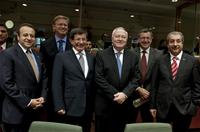 Last week Turkey made one more small step towards its membership to the European Union, for which it strives for more than 50 years. During the 9th EU-Turkey accession conference another chapter in the accession negotiations has been opened for the first time in nearly a year - chapter 12 for Food Safety, Veterinary and Phitosanitary Policy. Although the chapter is purely technical, the Spanish foreign minister Miguel Moratinos, who presided the conference for the last time in his capacity of a foreign minister of the Spanish EU Presidency, defined the event as very important and with great political importance.
Last week Turkey made one more small step towards its membership to the European Union, for which it strives for more than 50 years. During the 9th EU-Turkey accession conference another chapter in the accession negotiations has been opened for the first time in nearly a year - chapter 12 for Food Safety, Veterinary and Phitosanitary Policy. Although the chapter is purely technical, the Spanish foreign minister Miguel Moratinos, who presided the conference for the last time in his capacity of a foreign minister of the Spanish EU Presidency, defined the event as very important and with great political importance.
Why?
In December 2004 the European Council approved the start of the negotiations process with Turkey but in 2006 negotiations on 8 chapters have been frozen: Free Movement of Goods, Right of Establishment and Freedom to Provide Services, Financial Services, Agriculture and Rural Development, Fisheries, Transport Policy, Customs Union and External Relations. The reason for the decision was the Turkish failure to apply to Cyprus the Additional Protocol to the Ankara Agreement. This Protocol is directly related to the establishment of the customs union between Turkey and the EU, but Ankara refuses to apply it to Cyprus, whose Greek part is a member of the EU since 2004.
The freezing of the eight chapters is combined with another condition - temporary no chapters will be closed.
This is the reason why last week's event to be so important both for the EU and for Turkey. "This shows once again the negotiation process and therefore the accession process of Turkey to the EU are still very much alive and moving forward, making progress. So for the Spanish Presidency of the Eu today is an important 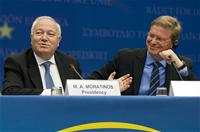 day", Mr Moratinos said. He added that there was no change in EU's position (Turkey to become a EU member).
day", Mr Moratinos said. He added that there was no change in EU's position (Turkey to become a EU member).
The European Commissioner for Enlargement, the Czech Stefan Fuele was a little bit more composed in his assessment. He accepted the definition of the Turkish delegation, led by the minister for foreign affairs Ahmet Davutoglu, that the chapter that had been opened was a heavy-weight chapter. "Today's decision about opening this chapter is a reflection of Turkey's efforts on the ground but at the same time a tangible evidence of EU's commitment to pursue the accession process. There is the issue of credibility between EU and Turkey. There should be a zero doubt about EU's commitment for Turkey's accession. The Turkey's credibility lies on the country's commitment to pursue the reforms".
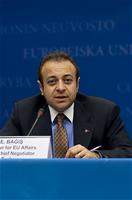 It is indeed the issue of credibility that appeared to be a little controversial during the press conference after the opening of chapter 12. The Turkish minister for European Affairs Egemen Bagis told the following story: "As we were driving here to open the chapter in traffic we had some difficulty because there is a strike here in Belgium, so we were a little late and I was wondering whether the strike was there to postpone the opening of the chapters to the Belgian Presidency. But here we are. We hope the chapters that cannot be opened due to political considerations maybe be opened". That much about credibility between the EU and Turkey.
It is indeed the issue of credibility that appeared to be a little controversial during the press conference after the opening of chapter 12. The Turkish minister for European Affairs Egemen Bagis told the following story: "As we were driving here to open the chapter in traffic we had some difficulty because there is a strike here in Belgium, so we were a little late and I was wondering whether the strike was there to postpone the opening of the chapters to the Belgian Presidency. But here we are. We hope the chapters that cannot be opened due to political considerations maybe be opened". That much about credibility between the EU and Turkey.
Another fact that speaks how significant the opening of the otherwise technical chapter 12 for EU-Turkey relations is that both countries realise very well the complexity of the accession process of the Muslim country with over 70 mn people population. No matter the excitement and the joy with this small step, the numerous layers in this long process can be seen with a bare eye.
The Turkish foreign minister Ahmet Davutoglu explained that whenever there 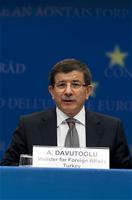 were technical chapters, the process was easy and depended entirely on what the Turkish government did on the ground. "So you can see that if there is a technical topic then the Turkish work day and night if necessary to fulfill those responsibilities. But if there are political criteria which are not based on any sort of objective criteria then it makes things difficult".
were technical chapters, the process was easy and depended entirely on what the Turkish government did on the ground. "So you can see that if there is a technical topic then the Turkish work day and night if necessary to fulfill those responsibilities. But if there are political criteria which are not based on any sort of objective criteria then it makes things difficult".
Responding to a journalist whether this chapter could be the last one for a long time ahead, Mr Bagis said he was not worried but he did not miss the chance to hint of double standards applied toward Turkey. He reminded that the Cyprus issue existed for a long time. It existed when Greece joined the EU, it existed when Cyprus became a member and this was why there was no reason this to be a problem for Turkey's accession. In order to disperse any doubts about double standards, Commissioner Fuele noted that the freezing of the eight chapters, related to the customs union, had happened because of the non-application of the additional Protocol to the Ankara Agreement. For no other reasons.
And one more very important thing which emerged during the 55 minutes long press conference after the opening of chapter 12, which is that the European Union was firmly behind Turkey in its conflict with Israel after the incident with the humanitarian flotilla, attacked by the Israeli military in international waters. Moratinos reminded that the EU condemned the disproportionate use of force and insisted on lifting the Gaza blockade. "We are very close to our Turkish friends, they suffered tremendously, they have lost a lot of life. We were behind the Turkish citizens and we were very firm towards Israel in this issue".
And if we remember that in the beginning of its rotating presidency Spain had the ambition 4 chapters to be opened in the negotiations with Turkey, and that in the very last day of the 6-month Presidency (June 30) only the first one has been opened, then we can again think about how hard it is for the EU to decide does it need Turkey or not. And if it does, how exactly - as a full member state or as a buffer zone on the "big chess-mate board", after the words of Zbigniew Brzezinski.
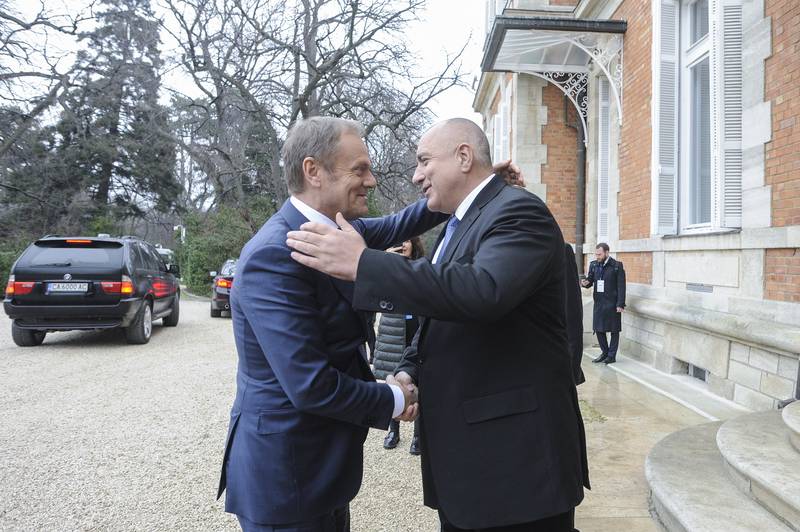 Donald Tusk, Boyko Borissov | © Council of the EU
Donald Tusk, Boyko Borissov | © Council of the EU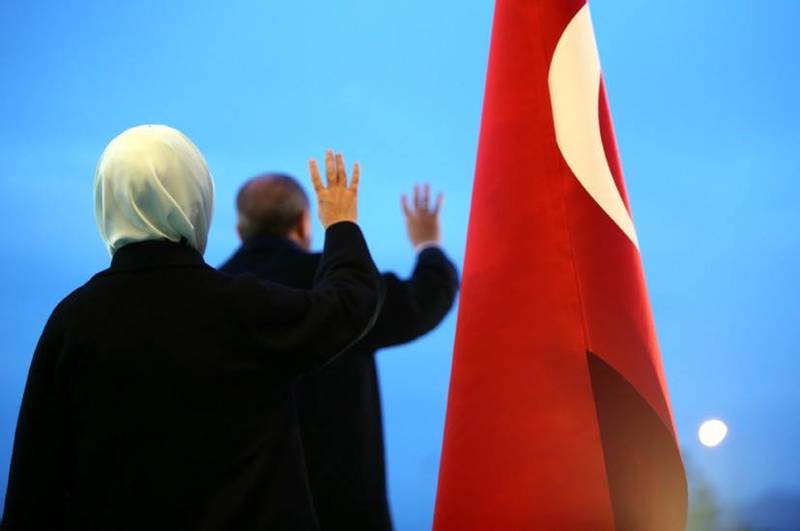 | © Turkey Presidency
| © Turkey Presidency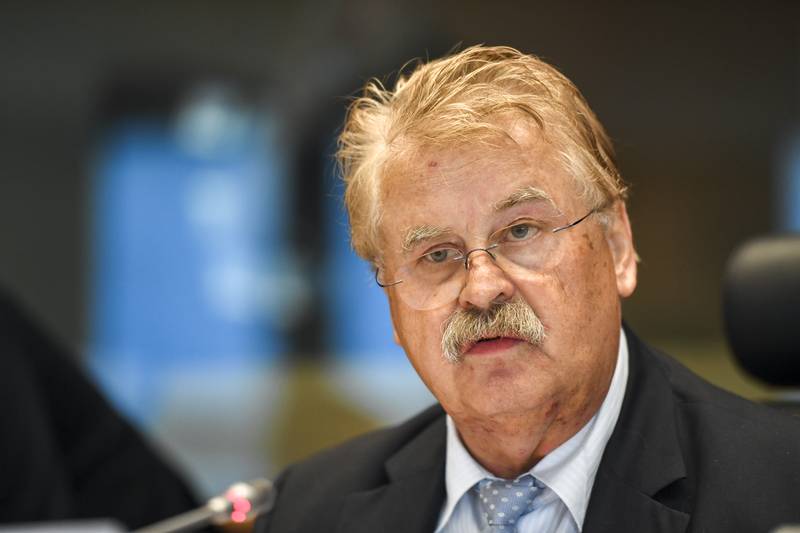 Elmar Brok | © European Parliament
Elmar Brok | © European Parliament